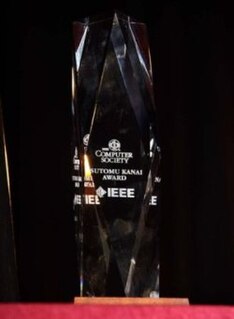
Wolfram Mathematica is a software system with built-in libraries for several areas of technical computing that allow machine learning, statistics, symbolic computation, manipulating matrices, plotting functions and various types of data, implementation of algorithms, creation of user interfaces, and interfacing with programs written in other programming languages. It was conceived by Stephen Wolfram, and is developed by Wolfram Research of Champaign, Illinois. The Wolfram Language is the programming language used in Mathematica.
Grid computing is the use of widely distributed computer resources to reach a common goal. A computing grid can be thought of as a distributed system with non-interactive workloads that involve many files. Grid computing is distinguished from conventional high-performance computing systems such as cluster computing in that grid computers have each node set to perform a different task/application. Grid computers also tend to be more heterogeneous and geographically dispersed than cluster computers. Although a single grid can be dedicated to a particular application, commonly a grid is used for a variety of purposes. Grids are often constructed with general-purpose grid middleware software libraries. Grid sizes can be quite large.
Alfred Vaino Aho is a Canadian computer scientist best known for his work on programming languages, compilers, and related algorithms, and his textbooks on the art and science of computer programming.

The Lovelace Medal was established by the British Computer Society in 1998, and is presented to individuals who have made outstanding contributions to the understanding or advancement of computing. It is the top award in computing in the UK. Awardees deliver the Lovelace Lecture.
Ian Tremere Foster is a New Zealand-American computer scientist. He is a distinguished fellow, senior scientist, and director of the Data Science and Learning division at Argonne National Laboratory, and a professor in the department of computer science at the University of Chicago.

Charles Eric Leiserson is a computer scientist, specializing in the theory of parallel computing and distributed computing, and particularly practical applications thereof. As part of this effort, he developed the Cilk multithreaded language. He invented the fat-tree interconnection network, a hardware-universal interconnection network used in many supercomputers, including the Connection Machine CM5, for which he was network architect. He helped pioneer the development of VLSI theory, including the retiming method of digital optimization with James B. Saxe and systolic arrays with H. T. Kung. He conceived of the notion of cache-oblivious algorithms, which are algorithms that have no tuning parameters for cache size or cache-line length, but nevertheless use cache near-optimally. He developed the Cilk language for multithreaded programming, which uses a provably good work-stealing algorithm for scheduling. Leiserson coauthored the standard algorithms textbook Introduction to Algorithms together with Thomas H. Cormen, Ronald L. Rivest, and Clifford Stein.
In parallel computing, an embarrassingly parallel workload or problem is one where little or no effort is needed to separate the problem into a number of parallel tasks. This is often the case where there is little or no dependency or need for communication between those parallel tasks, or for results between them.
ALGOL 68C is an imperative computer programming language, a dialect of ALGOL 68, that was developed by Stephen R. Bourne and Michael Guy to program the Cambridge Algebra System (CAMAL). The initial compiler was written in the Princeton Syntax Compiler that was implemented by J. H. Mathewman at Cambridge.
In computing, a parallel programming model is an abstraction of parallel computer architecture, with which it is convenient to express algorithms and their composition in programs. The value of a programming model can be judged on its generality: how well a range of different problems can be expressed for a variety of different architectures, and its performance: how efficiently the compiled programs can execute. The implementation of a parallel programming model can take the form of a library invoked from a sequential language, as an extension to an existing language, or as an entirely new language.
The International Parallel and Distributed Processing Symposium is an annual conference for engineers and scientists to present recent findings in the fields of parallel processing and distributed computing. In addition to technical sessions of submitted paper presentations, the meeting offers workshops, tutorials, and commercial presentations & exhibits. IPDPS is sponsored by the IEEE Computer Society's Technical Committee on Parallel Processing.

Chicken is a programming language, specifically a compiler and interpreter which implement a dialect of the programming language Scheme, and which compiles Scheme source code to standard C. It is mostly R5RS compliant and offers many extensions to the standard. The newer R7RS standard is supported through an extension library. Chicken is free and open-source software available under a BSD license. It is implemented mostly in Scheme, with some parts in C for performance or to make embedding into C programs easier.
Thomas Albert "Tom" DeFanti is an American computer graphics researcher and pioneer. His work has ranged from early computer animation, to scientific visualization, virtual reality, and grid computing. He is a distinguished professor of Computer Science at the University of Illinois at Chicago, and a research scientist at the California Institute for Telecommunications and Information Technology (Calit2).

Swanee River is a 1939 American film directed by Sidney Lanfield and starring Don Ameche, Andrea Leeds, Al Jolson, and Felix Bressart. It is a biopic about Stephen Foster, a songwriter from Pittsburgh who falls in love with the South, marries a Southern girl, then is accused of sympathizing when the Civil War breaks out. Typical of 20th Century Fox biographical films of the time, the film was more fictional than it was factual.
Global Arrays, or GA, is the library developed by scientists at Pacific Northwest National Laboratory for parallel computing. GA provides a friendly API for shared-memory programming on distributed-memory computers for multidimensional arrays. The GA library is a predecessor to the GAS languages currently being developed for high-performance computing.

The Tsutomu Kanai Award was established by the IEEE Computer Society in 1997 by an endowment from Hitachi Ltd., and named in honor of Dr. Tsutomu Kanai, who served as Hitachi’s president for 30 years. The Kanai Award may be presented annually upon the recommendation of the Kanai Award subcommittee, endorsement of the Awards Committee and approval of the Board of Governors. The Kanai Award recognized major contributions to the state-of-the-art distributed computing systems and their applications. The award consisted of a crystal model, a certificate, and $10,000.
The Sidney Fernbach Award established in 1992 by the IEEE Computer Society, in memory of Sidney Fernbach, one of the pioneers in the development and application of high performance computers for the solution of large computational problems as the Division Chief for the Computation Division at Lawrence Livermore Laboratory from the late 1950s through the 1970s. A certificate and $2,000 are awarded for outstanding contributions in the application of high performance computers using innovative approaches. The nomination deadline is 1 July each year.

Swift is an implicitly parallel programming language that allows writing scripts that distribute program execution across distributed computing resources, including clusters, clouds, grids, and supercomputers. Swift implementations are open-source software under the Apache License, version 2.0.

ACM SIGARCH is the Association for Computing Machinery's Special Interest Group on computer architecture, a community of computer professionals and students from academia and industry involved in research and professional practice related to computer architecture and design. The organization sponsors many prestigious international conferences in this area, including the International Symposium on Computer Architecture (ISCA), recognized as the top conference in this area since 1975. Together with IEEE Computer Society's Technical Committee on Computer Architecture (TCCA), it is one of the two main professional organizations for people working in computer architecture.

The Department of Computing (DoC) is the computer science department at Imperial College London. The department has around 50 academic staff and 1000 students, with around 600 studying undergraduate courses, 200 PhD students, and 200 MSc students. The department is predominantly based in the Huxley Building, 180 Queen's Gate, which it shares with the Maths department, however also has space in the William Penney Laboratory and in the Aeronautics and Chemical Engineering Extension. The department ranks 7th in the Times Higher Education 2020 subject world rankings.








